
Join us in the theater for a screening of City of Dreams: From Mountains to Oceans, a compelling docudrama centered around the remarkable journey of Bhutanese filmmaker Karma Deki in the film industry. Directed by Karma Deki herself, the film seamlessly blends real-life experiences with compelling storytelling, offering insight into the triumphs and obstacles faced by women in cinema. The screening will be followed by a conversation with director Karma Deki.
About the Film
In the dual role of director and protagonist, Karma Deki guides viewers through a captivating tale of self-discovery, resilience, and ambition. From exhilarating highs to challenging lows, we follow Karma’s unwavering pursuit of success in the ever-evolving world of filmmaking. In the realm of cinema, every heartfelt laugh and tearful moment owes its existence to the dedication of a director.
For true cinephiles, the magic lies not only in the actors on screen but also in the visionary behind the camera. Behind each emotionally evocative film lies the journey of a filmmaker, striving to manifest their creative vision into reality. Among these storytellers stands a female filmmaker from the breathtaking landscapes of Bhutan, nestled in the majestic Himalayas. As her narrative unfolds, we witness the resilience and passion that drive her through the challenges of her craft, showcasing her unique journey in the world of cinema.
This film is written and directed by Karma Deki (Bhutan Infotainment) and produced by Namgay Tshering (Kushuthara Entertainment).
About the Speaker
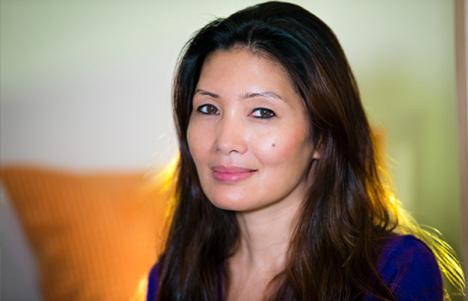
Karma Deki is a passionate and visionary filmmaker committed to illuminating the narratives of marginalized communities and amplifying their voices. As the CEO of Bhutan Reel Stories and president at Women in Film and Television, Bhutan, Karma has cultivated a community of film enthusiasts and is a fierce advocate for inclusivity in the industry. Driven by compassion, mindfulness, and community values, Karma believes in the transformative power of storytelling to raise awareness on social issues and inspire positive change. Learn more at karmadeki.com.
This program is hosted by Tashi Chodron, Himalayan programs and communities ambassador at the Rubin.
The Rubin Museum’s programs are made possible by the New York State Council on the Arts with support of the Office of Governor Kathy Hochul and the New York State Legislature, as well as by generous donations from the Museum’s Board of Trustees, individual donors, and members.

Most of us think of death as something clear-cut, and that medical science has it neatly figured out. The feature documentary Tukdam: Between Worlds by Donagh Coleman explodes such assumptions through its exploration of a phenomenon that blurs life and death to an unprecedented degree. In what Tibetan Buddhists call tukdam, advanced meditators die in a consciously controlled manner. Though dead according to our biomedical standards, they often stay sitting upright in meditation; remarkably, their bodies remain fresh and lifelike, without signs of decay for days, sometimes weeks after clinical death. Following ground-breaking scientific research into tukdam and taking us into intimate death stories of Tibetan meditators, the film juxtaposes scientific and Tibetan perspectives as it tries to unravel the mystery of this interstitial state.
The screening is preceded by a 2:15 PM guided tour of the exhibition Death Is Not the End and followed by a Q&A with the filmmaker and other guests.Tours last approximately 45 minutes.
About the Filmmaker
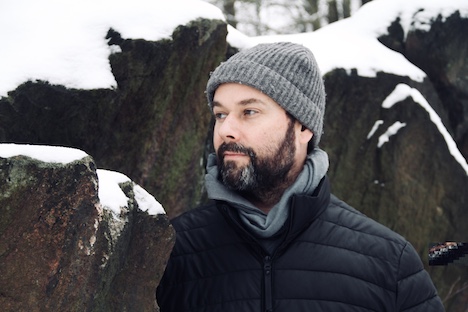
Finnish-Irish-American filmmaker Donagh Coleman holds degrees in Philosophy and Psychology and Music and Media Technologies from Trinity College Dublin, and a MA in Asian Studies from UC Berkeley. Previous films include A Gesar Bard’s Tale (winner of best documentary film at the 2014 First Peoples’ Festival in Montreal and premiered at the Rubin), and Stone Pastures (winner of the Grand Prix prize at the 2009 Cervino Cinemountain International Film Festival in Italy). Besides films and TV-docs, Donagh directs radio documentaries for the Finnish and Irish national broadcasters. His radio feature Gesar! was Finland’s entry for the 2012 Prix Italia competition, and his feature Do I Exist? was Finland’s entry for the 2015 Prix Europa competition. Donagh has also worked as a TV journalist and presenter for the Finnish broadcaster YLE News. He is currently doing a PhD in medical anthropology at UC Berkeley, continuing the research conducted for his 2022 feature documentary on meditative Tibetan Buddhist tukdam deaths.
Death Is Not the End is supported by the E. Rhodes and Leona B. Carpenter Foundation, Ellen Bayard Weedon Foundation, Robert Lehman Foundation, and The Prospect Hill Foundation.
The Rubin Museum’s programs are made possible by the New York State Council on the Arts with the support of the Office of Governor Kathy Hochcul and the New York State Legislature.
This project is supported in part by the National Endowment for the Arts.
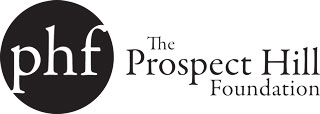


Most of us think of death as something clear-cut, and that medical science has it neatly figured out. The feature documentary Tukdam: Between Worlds by Donagh Coleman explodes such assumptions through its exploration of a phenomenon that blurs life and death to an unprecedented degree. In what Tibetan Buddhists call tukdam, advanced meditators die in a consciously controlled manner. Though dead according to our biomedical standards, they often stay sitting upright in meditation; remarkably, their bodies remain fresh and lifelike, without signs of decay for days, sometimes weeks after clinical death. Following ground-breaking scientific research into tukdam and taking us into intimate death stories of Tibetan meditators, the film juxtaposes scientific and Tibetan perspectives as it tries to unravel the mystery of this interstitial state.
The screening is preceded by a 6:15 PM guided tour of the exhibition Death Is Not the End and followed by a Q&A with neuroscientist Dr. Richie Davidson and filmmaker Donagh Coleman.
About the Filmmaker

Finnish-Irish-American filmmaker Donagh Coleman holds degrees in Philosophy and Psychology and Music and Media Technologies from Trinity College Dublin, and a MA in Asian Studies from UC Berkeley. Previous films include A Gesar Bard’s Tale (winner of best documentary film at the 2014 First Peoples’ Festival in Montreal and premiered at the Rubin), and Stone Pastures (winner of the Grand Prix prize at the 2009 Cervino Cinemountain International Film Festival in Italy). Besides films and TV-docs, Donagh directs radio documentaries for the Finnish and Irish national broadcasters. His radio feature Gesar! was Finland’s entry for the 2012 Prix Italia competition, and his feature Do I Exist? was Finland’s entry for the 2015 Prix Europa competition. Donagh has also worked as a TV journalist and presenter for the Finnish broadcaster YLE News. He is currently doing a PhD in medical anthropology at UC Berkeley, continuing the research conducted for his 2022 feature documentary on meditative Tibetan Buddhist tukdam deaths.
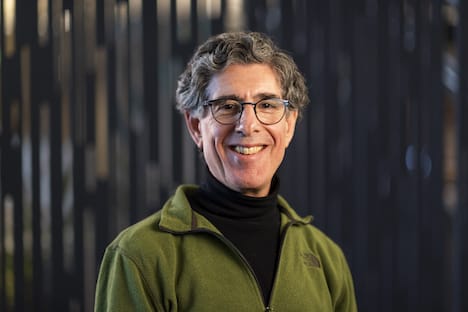
Richie Davidson is best known for his groundbreaking work studying emotion and the brain. A friend and confidante of the Dalai Lama, Time magazine named Davidson one of “The 100 Most Influential People in the World” in 2006. His research is broadly focused on the neural bases of emotion and emotional style, as well as methods to promote human flourishing, including meditation and related contemplative practices. Davidson is the William James and Vilas Professor of Psychology and Psychiatry at the University of Wisconsin”“Madison where he has been a faculty member since 1984. He is the founder of Healthy Minds Innovations, Inc., an external, affiliated nonprofit dedicated to supporting the mission of the Center for Healthy Minds. On the Advisory Council of the Rubin, his Brainwave appearances include a conversation with filmmaker Khyentse Norbu and in conjunction with the premiere of the film Free the Mind about his research on meditation and trauma. He most recently joined Zainab Salbi for a film to launch the Rubin’sMandala Lab in Bilbao in 2022.
Death Is Not the End is supported by the E. Rhodes and Leona B. Carpenter Foundation, Ellen Bayard Weedon Foundation, Robert Lehman Foundation, and The Prospect Hill Foundation.
The Rubin Museum’s programs are made possible by the New York State Council on the Arts with the support of the Office of Governor Kathy Hochcul and the New York State Legislature.
This project is supported in part by the National Endowment for the Arts.



Pre-screening tour of the galleries: 2:45″“3:15 PM
Screening and talkback in the theater: 3:30″“4:50 PM
Join us for the the NYC Premiere of the new short film Above and Below, directed and produced by Sheri Brenner, which follows the 19-year rise of artist Tsherin Sherpa. Trained in the art of Tibetan Buddhist thangka painting, Tsherin comes from Kathmandu to San Francisco as a devout religious painter, and struggles to reinvent himself in a new land. In doing so, he finds new meaning for an ancient art form and skyrockets his career to global art stardom.
Throughout the 34-minute film, attendees will recognize artworks by Tsherin Sherpa which have been featured in Rubin Museum exhibitions spanning over a decade, from the 2010 group exhibition Tradition Transformed to solo artworks such as Wish-Fulfilling Tree, crafted in collaboration with local Nepalese metal artists and craftsmen in response to the devastating 2015 Ghorka earthquake in Nepal.
Following the film screening, there will be a talkback and audience Q&A with Rubin Museum Executive Director Jorrit Britschgi and director Sheri Brenner on stage, who will be joined virtually by Tsherin Sherpa.
About the artists
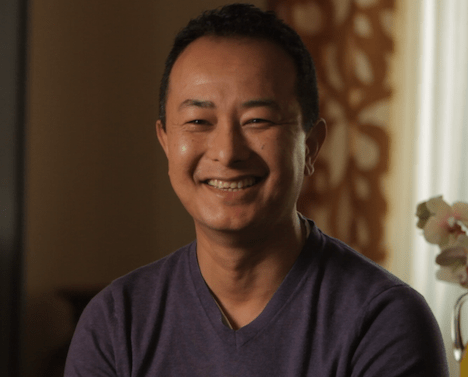
Tsherin Sherpa was born in Kathmandu, Nepal, in 1968, and currently lives and works between California and Nepal. From the age of 13, he was trained in traditional Tibetan thangka painting by his father, Master Urgen Dorje. In 1998 Sherpa immigrated to California, where he taught traditional thangka painting until he began to explore his own style, drawing on the visual vocabulary of thangka painting to create artworks that incorporate Buddhist iconography and pop-culture references. His works offer an interplay and juxtaposition between sacred/secular, traditional/contemporary, and settlement/movement. Sherpa’s practice stems from his personal experiences within the Himalayan diaspora, as well as the nomadic history of Himalayan peoples. Sherpa has participated in numerous exhibitions in Asia, Europe, and the US, including representing Nepal for its inaugural participation at the Venice Biennale in 2022. His works are in the major museum collections. In February 2022 the Virginia Museum of Fine Arts presented his first museum, mid-career retrospective. In 2022, Tsherin Sherpa joined the Rubin Museum’s Board of Trustees.
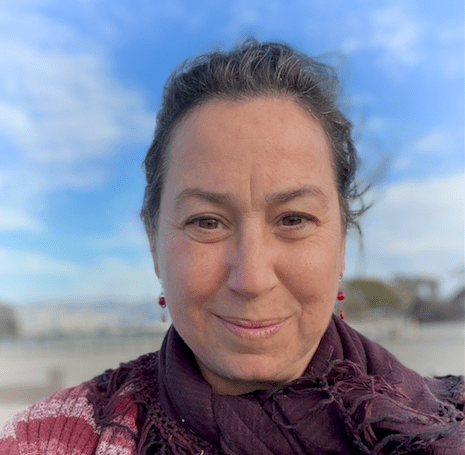
Sheri Brenner has produced and directed numerous documentaries on world culture, spiritual philosophy, sacred art, science, and technology. Her credits include the national PBS broadcast of Sandpainting: Sacred Art of Tibet, and In Beauty I Walk. Her life’s work is devoted to revealing and sharing the traditions, beliefs, and spiritual philosophies that lift up and strengthen all humanity. She holds an MFA degree in cinema from San Francisco State University, and was the recipient of a Haas Foundation Grant and a Columbia Foundation Grant. She currently serves as Adjunct Faculty and Media Lab Director in the Media Studies Program at the University of San Francisco.
Her film Above and Below is the outcome of a lifelong love of Buddhist art and philosophy. Her upcoming film, Images of Enlightenment was originally conceived as a companion piece to Above and Below. It tells the story of Tsherin’s father, Urgen Dorje Sherpa, and his contributions to the art of thangka painting.
“this body is so impermanent”¦” (Vimalakirti Sutra, Chapter Two)
Film directed by Peter Sellars
Presented with the Fisher Center at Bard
Film schedule:
Friday, February 10, 7:00 PM
Saturday, February 11, 2:00 PM
Sunday, February 12, 2:00 PM
The Vimalakirti Sutra, a foundational scripture of Zen Buddhism from the first century CE, understands illness as a path of spiritual awakening. Inspired by this visionary sutra, five virtuosic and singular artists—master calligrapher Wang Dongling, devotional singer Ganavya, improvisatory dancer Michael Schumacher, cinematographer Yu Lik-wai, and director Peter Sellars—came together in the autumn of 2020 to create this 79-minute work. The film explores the deepest of human experiences—health and mortality, spirituality and transcendence—all heightened by the pandemic. Filmed during the 2020 lock down in real-time via a specially created digital platform, with the artists collaborating remotely from Portland, Amsterdam, and Hangzhou, China, this work’s purpose became all the more immediate as illness changed the world in a matter of months.
Co-produced by the Fisher Center and the UCLA Boethius Initiative, with an early iteration of the project first workshopped at the Rubin Museum in 2011, the film features cinematography by Yu Lik-wai, sound design by Shahrokh Yadegari, editing by Tim Squyres, English translation by Robert Thurman, and Chinese translation by KumÄrajÄ«va.
Screenings are followed by a conversation with director Peter Sellars and practitioners in the field of healing and the arts:
Friday, February 10 (7:00″“9:00 PM) with Tibetan doctor Kunga Wangdue.
Saturday, February 11 (2:00″“4:30 PM) with singer Ganavya, dancer Michael Schumacher, Wang Dongling’s artistic liaison Yibin Wang, and film editor Tim Squyres.
Sunday, February 12 (2:00″“4:30 PM) with palliative care physician Dr. Craig Blinderman and Dean of Columbia University School of the Arts Carol Becker.
About the director
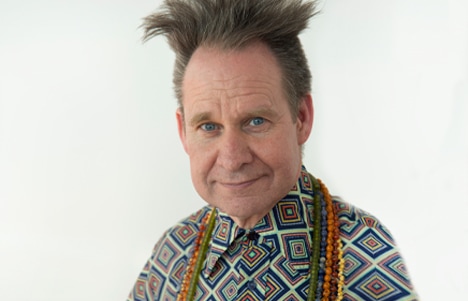
Peter Sellars is an opera, film, theater, and festival director who has gained international renown for his groundbreaking and transformative interpretations of classics, advocacy of 20th-century and contemporary music, and collaborative projects with an extraordinary range of creative artists. Sellars has led major arts festivals in Los Angeles, Adelaide, and Vienna. He is a Distinguished Professor in the Department of World Arts and Cultures/Dance and Director of the Boethius Initiative at UCLA, and a resident curator of the Telluride Film Festival. Initiated at a workshop on the Vimalakirti Sutra at the Rubin in 2011, Sellars conceived and directed this further exploration of the sutra, this body is so impermanent”¦, in response to the COVID-19 pandemic.
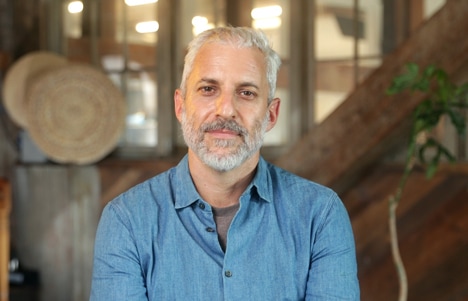
Dr. Craig D. Blinderman is the Director of the Adult Palliative Medicine Service at Columbia University Irving Medical Center/New-York Presbyterian Hospital, and an Associate Professor of Medicine in the Department of Medicine, Columbia University, Vagelos College of Physicians & Surgeons. Medical ethics and narrative ethics are among his particular interests in the field of palliative and end of life care. Dr. Blinderman also serves on the advisory board and teaches at the New York Zen Center for Contemplative Care in New York City. This is his second appearance at the Rubin.
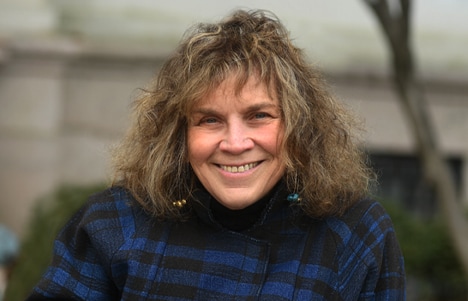
Carol Becker is Dean of Columbia University School of the Arts. She is the author of The Invisible Drama: Women and the Anxiety of Change; Zones of Contention: Essays on Art, Institutions, Gender, and Anxiety; Thinking in Place: Art, Action, and Cultural Production; Surpassing the Spectacle: Global Transformations and the Changing Politics of Art; and Artist in Society: Rights, Roles, and Responsibilities. Her recent memoir is Losing Helen: An Essay.
Carol was Dean of Faculty and Vice-President for Academic Affairs at the School of the Art Institute of Chicago before arriving at Columbia University. She travels widely and lectures on issues of art and society.
These screenings are made possible through support from the Fisher Center at Bard, New York Life, Barbara and Sven Huseby, Columbia University’s Division of Narrative Medicine, and Columbia University School of the Arts.
“this body is so impermanent”¦” (Vimalakirti Sutra, Chapter Two)
Film directed by Peter Sellars
Presented with the Fisher Center at Bard
Film schedule:
Friday, February 10, 7:00 PM
Saturday, February 11, 2:00 PM
Sunday, February 12, 2:00 PM
The Vimalakirti Sutra, a foundational scripture of Zen Buddhism from the first century CE, understands illness as a path of spiritual awakening. Inspired by this visionary sutra, five virtuosic and singular artists—master calligrapher Wang Dongling, devotional singer Ganavya, improvisatory dancer Michael Schumacher, cinematographer Yu Lik-wai, and director Peter Sellars—came together in the autumn of 2020 to create this 79-minute work. The film explores the deepest of human experiences—health and mortality, spirituality and transcendence—all heightened by the pandemic. Filmed during the 2020 lock down in real-time via a specially created digital platform, with the artists collaborating remotely from Portland, Amsterdam, and Hangzhou, China, this work’s purpose became all the more immediate as illness changed the world in a matter of months.
Co-produced by the Fisher Center and the UCLA Boethius Initiative, with an early iteration of the project first workshopped at the Rubin Museum in 2011, the film features cinematography by Yu Lik-wai, sound design by Shahrokh Yadegari, editing by Tim Squyres, English translation by Robert Thurman, and Chinese translation by KumÄrajÄ«va.
Screenings are followed by a conversation with director Peter Sellars and practitioners in the field of healing and the arts:
Friday, February 10 (7:00″“9:00 PM) with Tibetan doctor Kunga Wangdue.
Saturday, February 11 (2:00″“4:30 PM) with singer Ganavya, dancer Michael Schumacher, Wang Dongling’s artistic liaison Yibin Wang, and film editor Tim Squyres.
Sunday, February 12 (2:00″“4:30 PM) with palliative care physician Dr. Craig Blinderman and Dean of Columbia University School of the Arts Carol Becker.
About the director
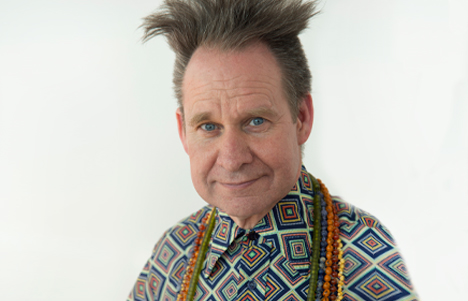
Peter Sellars is an opera, film, theater, and festival director who has gained international renown for his groundbreaking and transformative interpretations of classics, advocacy of 20th-century and contemporary music, and collaborative projects with an extraordinary range of creative artists. Sellars has led major arts festivals in Los Angeles, Adelaide, and Vienna. He is a Distinguished Professor in the Department of World Arts and Cultures/Dance and Director of the Boethius Initiative at UCLA, and a resident curator of the Telluride Film Festival. Initiated at a workshop on the Vimalakirti Sutra at the Rubin in 2011, Sellars conceived and directed this further exploration of the sutra, this body is so impermanent”¦, in response to the COVID-19 pandemic.
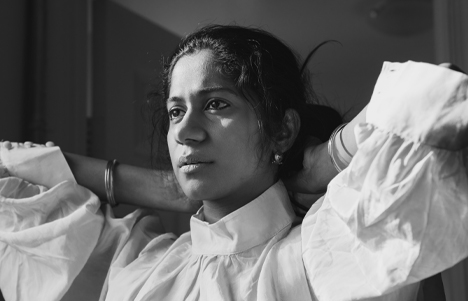
Ganavya is a New York-born and Tamil Nadu-raised vocalist who has trained as an improviser, scholar, dancer, and multi-instrumentalist. She maintains an inner library of “spi/ritual” blueprints offered to her by an intergenerational constellation of collaborators, continuously anchoring her practice in pasts, presents, and futures. Much of her childhood was on the pilgrimage trail, learning the storytelling art form of harikathÄ and singing poetry that critiques hierarchical social structures. She has appeared multiple times at the Rubin most notably for the launch of her first solo album Aikyam: Onnu in 2018. She is a co-founder of the non-hierarchical We Have Voice Collective.
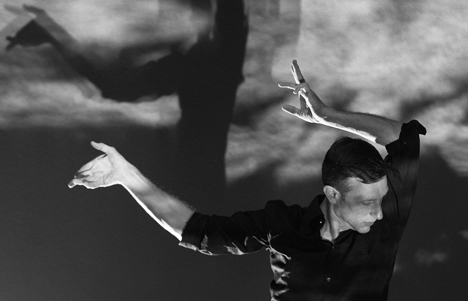
Michael Schumacher is a performing artist with roots in classical and modern dance. He has been a member of Ballet Frankfurt, Twyla Tharp Dance, Feld Ballet, Pretty Ugly Dance Company, and Magpie Music Dance Company. As an independent artist, he has collaborated with and appeared in productions of Peter Sellars, William Forsythe, Jiřà Kylián, Sylvie Guillem, and Anouk van Dijk. He currently resides in Amsterdam (where his section of the film was shot) and conducts workshops in movement analysis and improvisation worldwide. Schumacher was part of the original workshop at the Rubin of the Vimalakirti Sutra in 2011.
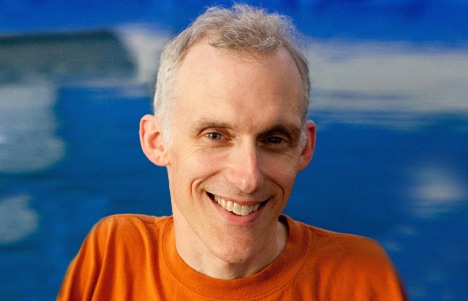
Tim Squyres has edited 25 feature films, including 13 for director Ang Lee. Four have received Oscar nominations for Best Picture: Life of Pi (2012); Gosford Park (2001); Crouching Tiger, Hidden Dragon (2000); and Sense and Sensibility (1995). Other films include Unbroken (2014); Rachel Getting Married (2008); Syriana (2005); The Ice Storm (1997); and The Wedding Banquet (1993). His work has received two Oscar nominations for editing. He has also edited a wide variety of television and music video projects, and his documentary work includes collaborations with Bill Moyers, Michael Moore, Alex Gibney, and George Butler.
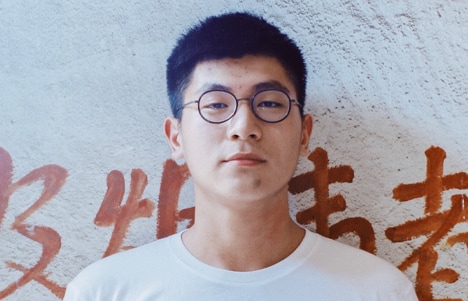
Yibin Wang was born and raised in Hangzhou, China. As a multi-disciplinary theater artist, he is interested in rituals, mind-body connection, and new technologies in the theatrical space and the difference between the East and the West in these fields. He has been the Associate Artistic Director of the 2020 B.O.N.D International Virtual Performance Festival and the Co-Curator of the 2021 Designing Care Project in Hangzhou. He holds a BA in Theater and Performance from Bard College and is currently pursuing an MFA in Directing at Columbia University.
These screenings are made possible through support from the Fisher Center at Bard, New York Life, Barbara and Sven Huseby, Columbia University’s Division of Narrative Medicine, and Columbia University School of the Arts.
“this body is so impermanent”¦” (Vimalakirti Sutra, Chapter Two)
Film directed by Peter Sellars
Presented with the Fisher Center at Bard
Film schedule:
Friday, February 10, 7:00 PM
Saturday, February 11, 2:00 PM
Sunday, February 12, 2:00 PM
The Vimalakirti Sutra, a foundational scripture of Zen Buddhism from the first century CE, understands illness as a path of spiritual awakening. Inspired by this visionary sutra, five virtuosic and singular artists—master calligrapher Wang Dongling, devotional singer Ganavya, improvisatory dancer Michael Schumacher, cinematographer Yu Lik-wai, and director Peter Sellars—came together in the autumn of 2020 to create this 79-minute work. The film explores the deepest of human experiences—health and mortality, spirituality and transcendence—all heightened by the pandemic. Filmed during the 2020 lock down in real-time via a specially created digital platform, with the artists collaborating remotely from Portland, Amsterdam, and Hangzhou, China, this work’s purpose became all the more immediate as illness changed the world in a matter of months.
Co-produced by the Fisher Center and the UCLA Boethius Initiative, with an early iteration of the project first workshopped at the Rubin Museum in 2011, the film features cinematography by Yu Lik-wai, sound design by Shahrokh Yadegari, editing by Tim Squyres, English translation by Robert Thurman, and Chinese translation by KumÄrajÄ«va.
Screenings are followed by a conversation with director Peter Sellars and practitioners in the field of healing and the arts:
Friday, February 10 (7:00″“9:00 PM) with Tibetan doctor Kunga Wangdue.
Saturday, February 11 (2:00″“4:30 PM) with singer Ganavya, dancer Michael Schumacher, Wang Dongling’s artistic liaison Yibin Wang, and film editor Tim Squyres.
Sunday, February 12 (2:00″“4:30 PM) with palliative care physician Dr. Craig Blinderman and Dean of Columbia University School of the Arts Carol Becker.
About the director
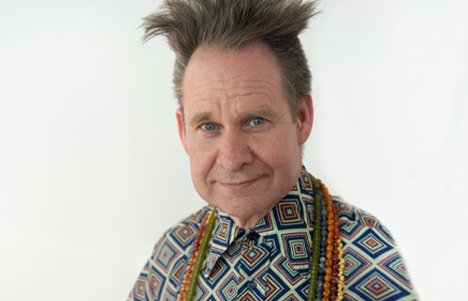
Peter Sellars is an opera, film, theater, and festival director who has gained international renown for his groundbreaking and transformative interpretations of classics, advocacy of 20th-century and contemporary music, and collaborative projects with an extraordinary range of creative artists. Sellars has led major arts festivals in Los Angeles, Adelaide, and Vienna. He is a distinguished professor in the Department of World Arts and Cultures/Dance and director of the Boethius Initiative at UCLA, and a resident curator of the Telluride Film Festival. Initiated at a workshop on the Vimilakirti Sutra at the Rubin in 2011, Sellars conceived and directed this further exploration of the sutra with this body is so impermanent”¦ in response to the COVID-19 pandemic.

Menpa Kunga Wangdue is a doctor practicing Tibetan medicine in New York City. Born in Tibet, he graduated from Tibetan Medical and Astrology College in India in 1996. He completed a year-long internship under Senior Menpa Kunga Gyurme, the former personal physician of the Dalai Lama. From 1998 to 2002, he served as a clinical practitioner in Nepal. Menpa Wangdue has since been practicing Tibetan medicine in New York, and is the Vice President of the Traditional Tibetan Medical and Astro Association New York. He is a member of the Community Advisory Group on the exhibition Healing Practices: Stories from Himalayan Americans, which was on view from March 18, 2022, through January 16, 2023.
These screenings are made possible through support from the Fisher Center at Bard, New York Life, Barbara and Sven Huseby, Columbia University’s Division of Narrative Medicine, and Columbia University School of the Arts.
Ganden: A Joyful Land (film)
Ngawang Choephel | 2019 | India and USA | 76 minutes
World Premiere
Ganden is the most influential monastery of Tibetan Buddhism, likened by Buddhists to the Vatican. It is here where the Dalai Lama’s lineage began. For more than five hundred years, monks lived in Ganden in simplicity and contentment, before a brutal invasion drove them from their beloved home to start anew in India.
Directed by Sundance Jury Award Winner Ngawang Choephel, whose film Tibet in Song thrilled Rubin audiences and critics alike, and made in collaboration with creative consultant singer Annie Lennox, Ganden: A Joyful Land embodies the strength and joy taught by the Buddhist faith. Featuring contemporary interviews with survivors of the exodus, animations, and remarkable documentary footage from 1940s Tibet, the film honors the stories of the monks’ lives in both the old and new Ganden.
The screening will be followed by a talkback with the director, Ngawang Choephel, and a reception in the K2 lounge which is open to all ticket holders.
ABOUT THE DIRECTOR
Ngawang Choephel was born in Dawa, a small county in western Tibet. During the height of the Cultural Revolution, at the age of two, Ngawang and his family escaped to India. He grew up in a vibrant Tibetan refugee community in Southern India. Because of his lifelong passion for Tibetan music, he has devoted himself to its preservation and dissemination. Discovering his talent at an early age, he pursued and received a degree in Tibetan music from the Tibetan Institute of Performing Arts in Dharamsala, India. Arriving in the West in 1994, he became a Fulbright Fellow at Middlebury College in Vermont and continued studies in video production and international music in preparation for the production of his award-winning film, Tibet in Song. After being arrested by Chinese authorities in Tibet during filming and subsequently spending six and a half years in prison, in 2002 he received the Courage of Conscience Award from Peace Abbey for showing resilience in the face of adversity. That same year he was awarded an honorary doctor of arts degree from Middlebury College, as well as the Best Act in Exile Award from Lobsang Wangyal Productions for his outstanding musical talent.
K2 Friday Night is sponsored by New York Life*

*”NEW YORK LIFE” and the NEW YORK LIFE Box Logo are trademarks of New York Life Insurance Company. Other trademarks are the property of their respective owners.
Please note: This screening is only accessible for viewers located in the five boroughs of New York City. If you’re located elsewhere and would like to locate a virtual for your location, please click here.
Watch a virtual screening of Looking for a Lady with Fangs and a Moustache followed by a conversation between the director Khyentse Norbu and renowned neuroscientist Dr. Richard Davidson.
Set and filmed on location in Kathmandu, Looking for a Lady with Fangs and a Moustache is an existential mystery drama that tells the story of Tenzin, a modern Tibetan entrepreneur, utterly skeptical of ancient, mystical beliefs, who is suddenly haunted by frightening dreams and hallucinations. A sage tells him these are omens of his imminent death. Tenzin has seven days to save his life, leading to an unconventional, sacred journey into feminine energy.
Following the film, watch Khyentse Norbu and neuroscientist Richard Davidson discuss the mindsets at play in the film from both a spiritual and scientific viewpoint.
Run Time: 114 minute
About the Speakers
Khyentse Norbu, known in the Buddhist world as Dzongsar Khyentse Rinpoche, brings a profound and subtle mastery and understanding of Buddhist philosophy and practice to his films. He studied and trained with some of the leading Tibetan Buddhist masters of the 20th century, graduated from secular schools in India and Europe, and teaches Buddhism on five continents. He is the author of several books on following the Buddhist path in the contemporary world, including the best-selling What Makes You Not a Buddhist.
Norbu also oversees the nonprofit organizations Siddhartha’s Intent, Khyentse Foundation, 84000, and Lotus Outreach, as well as contemporary teaching and practice centers in different parts of the world. He is responsible for the care and education of 1,600 monks in six monasteries and institutes in Asia and is head of Dzongsar Monastery and College in Tibet, Dzongsar Khyentse Institute in India, and Chökyi Gyatso Institute for Buddhist Studies in Bhutan.
Norbu’s first film, The Cup (1999), became an international sensation after its premiere screening at the Cannes Film Festival’s prestigious Director’s Fortnight, going on to win considerable acclaim and popularity. Travellers & Magicians (2003) was the first full-length feature film shot in Bhutan. It premiered at the Venice International Film Festival. Vara: A Blessing (2013), based on a short story by Bengali author Sunil Gangopadhyay and filmed in Sri Lanka, won the Best Feature Film award at the Tribeca Online Film Festival. Hema Hema: Sing Me a Song While I Wait (2016) marked a return to Bhutan, winning the audience choice award at the 2016 Golden Global Awards at the Malaysian International Film Festival and honorable mention at the 2016 Toronto International Film Festival.
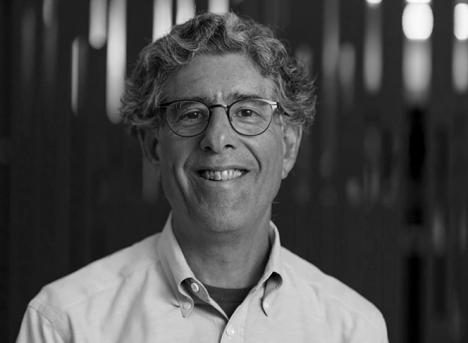
Richard J. Davidson, PhD, is the William James and Vilas Research Professor of Psychology and Psychiatry and Founder and Director of the Center for Healthy Minds, University of Wisconsin”“Madison.
He received his PhD from Harvard University in psychology and has been at Wisconsin since 1984. His research is broadly focused on the neural bases of emotion and emotional style and methods to promote human flourishing including meditation and related contemplative practices.
Dr. Davidson has published more than 440 articles, chapters, and reviews and edited 14 books. He co-authored The Emotional Life of Your Brain with Sharon Begley and Altered Traits: Science Reveals How Meditation Changes Your Mind, Brain, and Body with Daniel Goleman.
He is the recipient of many awards for his research including the William James Fellow Award from the American Psychological Society. He was named one of the 100 most influential people in the world by Time magazine in 2006. In 2017 he was elected to the National Academy of Medicine, and in 2018 appointed to the Governing Board of UNESCO’s Mahatma Gandhi Institute of Education for Peace and Sustainable Development (MGIEP).
Dr. Davidson is on the Advisory Council of the Rubin Museum of Art.
About Brainwave 2021: Awareness
In our hyperconnected world it’s easy to feel overwhelmed and distracted. This may seem like a modern problem, but the earliest Buddhist teachings sought to help followers awaken from similar states of disconnection. From the Buddhist perspective, the first step to awakening is cultivating awareness.
Through the lens of neuroscience and psychology, the Rubin Museum’s 2021 Brainwave program series will explore awareness with speakers from different walks of life and experiment with tools to reconnect with ourselves, our surroundings, and our communities. Pay what you wish to attend any of this year’s programs.
Lead support for Brainwave is provided by Science Sandbox, an initiative of Simons Foundation, and by the New York City Department of Cultural Affairs in partnership with the City Council. Major support is provided by Gerry Ohrstrom with program support provided by Cheryl Henson.

A moving documentary detailing the catastrophic results of the climate crisis, Jungwa documents the aftermath of the flash floods that devastated Leh, Ladkah, in 2010.
Using archival footage and interviews with director Stanzin Dorjai Gya, the film shows a community grappling with a new relationship to their natural surroundings and the broken balance of “Jungwa,” which in Ladakhi refers to the the four elements of air, fire, water, and earth.
A reminder of the impermanence of the planet itself, this documentary was selected among thousands of films from around the world to be shown at the United Nations COP21 Paris Conference on climate change in 2015.
The film will be followed by a talkback with director Stanzin Dorjai Gya.
This film is being screened in collaboration with the New Approaches in Himalayan Education Conference in association with Earth Day.
Himalayan Heritage programs are supported by Heather Beth Henson.
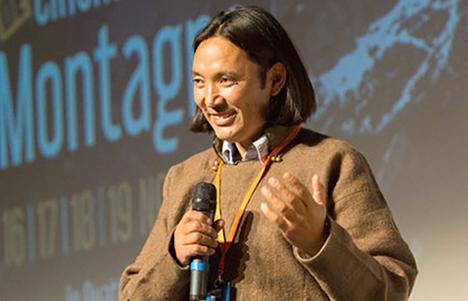
Stanzin Dorjai Gya hails from a remote village in northeastern India, at an elevation of more than 15,000 feet in the Himalayas. Like other children of Gya Village, Stanzin had a semi-nomadic childhood, spending half of the month tending his family’s herd of yaks and cashmere goats, and the other half attending school. In 1995, unable to pass the necessary standardized tests to complete high school, Stanzin began attending an alternative school, SECMOL (Students Educational and Cultural Movement of Ladakh). Dedicated to teaching students in a nontraditional setting (the students built the campus themselves using environmentally friendly materials), SECMOL ignited Stanzin’s passion for film. He earned his bachelor of arts at Jammu University in 2005. Later he met Christiane Mordelet, a French filmmaker, and they have since worked in close collaboration, producing internationally acclaimed, award-winning films.
The founder of the Himalayan Film House in Leh, Stanzin has directed and produced notable feature films and documentaries on regional, national, and international issues.
At the New York premiere film screening of Precious Guru, hear from filmmaker Marc Wennberg, Khenpo Tenzin Norgay Rinpoche from Palyul Dharma Center- Guru Lhakhang NYC and along with members of the United Bhutanese Association of New York (UBANY) who will discuss the Guru Rinpoche’s connection to Bhutanese culture and beyond.
Before the film, members of the UBANY will offer a dance and song of prayer to Padmasambhava. A short discussion and Q&A with UBANY Culture Director Karma Deki, Khenpo Tenzin Norgay Rinpoche of Palyul Dharma center ““ Guru Lhakhang and the film’s director follow the screening.

Khenpo Tenzin Norgay Rinpoche was born in Bhutan in 1965. After completing secondary school in 1986, he joined Ngagyur Nyingma Institute, the prestigious Buddhist studies and research center, at Namdroling Monastery in Mysore. At the Institute he studied under Khenchen Pema Sherab, Khenpo Namdrol Tsering, Khenchen Tsewang Gyatso, and other visiting professors, including Khenchen Jigme Phuntsok and Khenpo Pema Tsewang from Tibet. He completed the Shedra program in 1995 and joined the Institute staff, teaching there for three years. He was formally enthroned as Khenpo by His Holiness Penor Rinpoche in 1998 and was assigned by His Holiness to teach at the Buddhist college at Palyul monastery in Tibet. He is the main resident master at Palyul Dharma center.
PROGRAM HOST
Tashi Chodron, Himalayan Cultural Programs & Partnerships
Photographs by Jon Schechner
Mongolian culture is known worldwide for many things, including throat singing and horse racing, but did you know that Mongolia has also produced many of the world’s champion contortionists? For centuries a long line of Mongolian contortionists have been acclaimed for their strength, talent, and grace. The art form, which includes elements of traditional dance, has been documented as far back as the 17th century, when it was enjoyed as entertainment in Mongolia’s royal courts.
Join Mongolian filmmaker Sarnai Tessitore as she presents her film Body in Motion: Exploring the Art of Contortion. She will speak with the audience after the screening, joined by Buyansan Goldstein, an advisor to Mongolia Connections. Together they will discuss the history of the art form and the struggles and achievements of present-day artists who sacrifice so much to realize their dreams.
This program will be introduced by Museum educator Tashi Chodron who also manages Himalayan Heritage Programs and Partnerships. She will speak on 17th-century artist Zanabazaar, who is represented in the Rubin’s collection. A small number of devoted teachers and students of contortionism currently maintain the art form. They take inspiration from the legacy of performers and coaches such as Magjigsuren, Angelique, Otgo, and Undarmaa, all of whom are featured in the film.
About the Speakers
Sarnai Tessitore was born and raised in Communist Mongolia until the age of 15. She then moved to the United States and traveled the country by train with the circus in the early 1990s. She settled in Chicago to pursue an art degree in film and video, and in 2001 she graduated from Columbia College Chicago. She has participated in numerous films as an actor, director, and producer. Her films include the feature By the Will of Chinghis Khan (2009, producer) and Breakthrough (2016, director), an award winner in the 48-Hour Film Project in Chicago. The documentary film Why We March (2018) was her latest passion project.
Buyansan Goldstein, a graduate from the Fashion Institute of Technology (FIT), received a BA in arts and fashion. Her award-winning fashion designs have been displayed in exhibitions at FIT and in the Neiman Marcus Department Store. She is an advisor to Mongolia Connections, a cultural consulting organization, and is an active supporter of their cultural programs with museums and other institutions.
